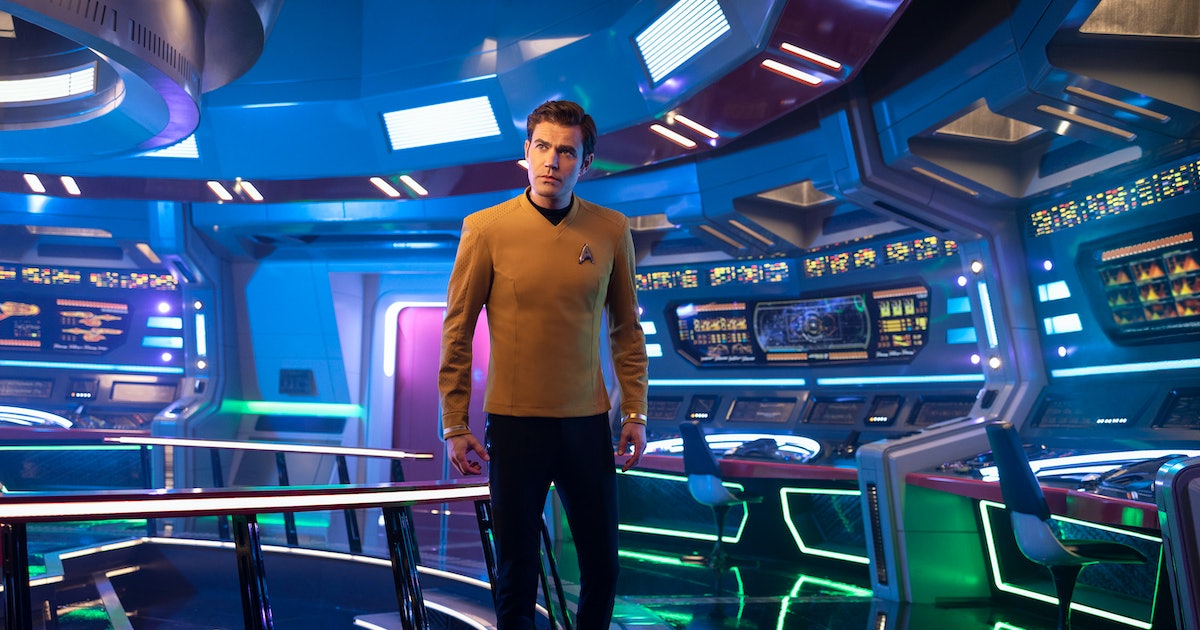A fairly thorough piece.
Whatever your view on whether it’s a pro or con for the ensemble and storytelling, SNW ‘Lost in Translation’ having covered off the ‘met him when he made fleet captain’ reference to Pike in TOS, there seems to be a great deal of flexibility for SNW to keep bringing Jim Kirk into its stories.
Here’s one unexpected take.
So what does that mean for Kirk? We have to wait until 2265 for him to take over as captain of the Enterprise, right? Well, maybe not. Canon is oddly vague on the handover from Pike to Kirk. In fact, only one episode of TOS actually takes place in 2265: “Where No Man Has Gone Before,” the second pilot. There’s also nothing that indicates Kirk didn’t serve on the Enterprise in another role before getting promoted. If, in theory, Pike were to step down and someone else became an interim captain, then nothing is stopping Kirk from serving on the Enterprise before 2265.



Other than the Kelvin timeline where they just said up front “THIS IS A DIFFERENT TIMELINE,” when has that ever happened?
Keep in mind, we’re talking about showrunners who contrived a reason for Pike to be “fleet captain” for a single episode just so they could have Kirk and Pike interact without invalidating one line from TOS: “Court Martial.” These showrunners really strike you as fans who are going to make “minor adjustments” and justify it with “well you see back in S02E03 we changed the timeline, so now we can do whatever we want!”
I’m all for keeping canon intact if its possible. But I hope they don’t get trigger happy with contrivances just to keep a line from the 60’s intact that more or less doesn’t matter too much. Does it really matter how much Kirk and Pike interacted? No, not really. But I can say I trust these writers, this show seems to care about Trek and what made it good a lot more than doing their own thing 100% (looking at you Disco).
I don’t really care if they mess around with continuity if continuity is interfering with a good story they want to tell. My point is that the SNW writers are making a clear and concerted effort to maintain continuity.
100% agree with you. The TOS loyalists are going out of their way to find excuses to hate this show. It’s the best series I have seen since TNG and I am not saying the others were bad. I actually like all of them with the exception of Discovery because it focuses so heavily on one plotline and one character.
This is an ensemble with humor when it needs it and is more true to the heart of Trek than people are giving it credit.
It is truly a return to the Golden Age of TNG/DS9/Voy and I’m all here for it. I missed the episode adventures. The way Disco does it is not it with the stories taking the whole season and the characters taking a back seat
This timeline is Altered not Alternate They did the same thing for First Contact, and ENT add just enough time travel to excuse not making the show into a history documentary yet none the less its considered part of the same story as everything that was made before but came later in the timeline.
Has the writing staff of First Contact ever confirmed, on the record, that it was their intent to alter the timeline? Has the writing staff for Enterprise ever indicated that they intended to depict an “altered” timeline?
You’re moving the goalposts asking for such explicits beyond what is reasonable. Why would they need to spell it out for you in an interview when they have the actors say “these events weren’t supposed to happen” repeatedly on screen? Are all viewers expected to familiarize themselves with every entertainment news article around and about a film or TV show in order to understand it? These things should be intuitive, and if what is intuitive isn’t the writer’s intent then that’s just a failure on the writer’s part.
The purpose of the “time has been altered and we need to fix the timeline” conversation that occurs near the beginning of every time travel story is definitely not to inform the audience that every subsequent installment of Star Trek will occur in an altered timeline.
In fact, it’s just the opposite. The entire reason the characters are so concerned with restoring the timeline is that they want to return to their lives in an unaltered timeline.
Except total unaltering is impossible you can put the big history book events back into place (ie zefram cochrane invented the human iteration of warp drive) but the butterflies are still set loose (ie zefram cochrane was told about the enterprise-E by time travelers and was shown it through a telescope in order to gain his trust and cooperation, a century later a hitherto unmentioned ship of the same name and rough silhouette would be launched supplanting Dauntless as the name associated with the NX-01 registry.) Our time travelers don’t notice the differences when they return home because they are so far removed from the altered events that the fog of history essentially covers things up.
Interesting headcanon, but headcanon nevertheless. I’d wager heavily that neither the First Contact nor Enterprise production staff share this interpretation, much less intended it.
I’d take up that wager they used the same actor for zefram cochrane to do the traditional new series handoff, they cast him as involved in the NX-01’s multi decade development program before he disappeared.
How does Cromwell reprising Cochrane in “Broken Bow” support the notion that Enterprise is in a different timeline from all previous Star Trek? I don’t see how these things are connected at all.